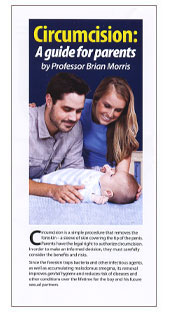Circumcision - Penile Hygiene
Those who advocate not circumcising nevertheless stress that lifelong penile hygiene is required. This acknowledges that something harmful or unpleasant is happening under the prepuce. Studies of middle-class British [Kalcev, 1964] and Scandanavian [Oster, 1968] schoolboys concluded that penile hygiene, as such, is at best poor and at worst non-existent. In the private British boarding school studied, 80% of the uncircumcised boys had poor genital hygiene, and the Danish study found 4% had phimosis and 33% had an adherent foreskin.
Furthermore, Dr Terry Russell, an Australian medical practitioner and circumcision expert states "What man after a night of passion is going to perform penile hygiene before rolling over and snoring the night away (with pathogenic organisms multiplying in the warm moist environment under the prepuce)" [Russell, 1993]. The bacteria start multiplying again immediately after washing and contribute, along with skin secretions, to the whitish film, termed 'smegma', that is found under the foreskin.
Smegma is produced by the foreskin’s inner surface and contains neutral lipids, fatty acids, sterol and exfoliated cells. Excretion of smegma increases in adolescence and peaks at age 20–40 years. Whereas initially it is a lubricant having a white or pale yellow color, with time, chemical transformations take place and it becomes mixed with epithelial cells, dirt and micro-organisms; these form aggregates and produce foul odors.
The bacteria alone give off an offensive smell and most people consider smegma to be unclean [Wright, 1970]. Men differ in their sensitivity to this smell and some shower several times a day as a result (See section ‘What men say’). Some uncircumcised men, and/or their partners, find the stench so unpleasant that the foul odor has caused these men to seek a circumcision on this basis alone. Improved penile hygiene is perhaps the major reason for circumcision (82% in one study [Oh et al., 2002]) and, for most, smegma is regarded as unclean and infected with micro-organisms (88% in the same study [Oh et al., 2002]).
The problem of the foul odor of uncircumcised men has been recognized commercially by the development of an over-the-counter anti-fungal cream, NodorO (www.ismellperfect.com). The inventor states "I have no more fear of repulsing my partner due to bad genital odors" (http://perezhilton.com/?p=11521). He also states "Men have had to deal with this problem for centuries, and women have had to deal with their partners having MGO [male genital eThis subject has been taboo for the longest time. The truth is that bad MGO is a real turn off to women, and too embarrassing to discuss." However, since MGO is caused mainly by the bacterium Mycobacterium smegmatis it is doubtful that a fungicide would be very effective.
Penile hygiene is often difficult to achieve and attempting a very high degree of hygiene in uncircumcised men can result in new dermatological problems. For mothers and fathers, it is far easier to maintain cleanliness of their son's penis if it is circumcised. If their son is not circumcised the messages are confusing: should they clean under the foreskin or leave it alone?
A survey in London of 150 uncircumcised and 75 circumcised men found 4% of circumcised compared with 26% of uncircumcised men had inferior genital hygiene behavior, i.e., did not always wash the entire penis (the uncircumcised men did not always wash under the foreskin) [O'Farrell et al., 2005]. Balanitis, phimosis or other foreskin conditions that made foreskin retraction painful might have contributed to their inferior hygiene. The circumcised men also washed the genitals more than once per day (37% vs 19%; P = 0.01). A UK study found penile wetness (an indicator of poor hygiene) in 17.4% of men whose foreskin covered the urinary meatus (two-thirds of the 422 men in the study) compared with 4.9% of those with a visible meatus (odds ratio, OR = 4.3) [O'Farrell et al., 2008]. Penile wetness was independently associated with balanitis (odds ratio 4.1), and non-specific urethritis or Chlamydia (OR = 2.1). It was not associated with retraction of the foreskin on passing urine.
Anti-circumcision activists make unusual claims about the smegma and even believe there are glands under the foreskin that secrete pheromones important in sexual attraction, as alluded to earlier. There is no support for such claims and all of their statements should be regarded as fantasies unless proven otherwise by credible scientific evidence.
The moist tip of an uncircumcised erect penis could permit quicker penetration. However, the requirements of the modern woman generally differ somewhat from this kind of sex, which might have had some benefit for primitive humans who may have wanted to complete the sex act quickly to minimize the time they were vulnerable to predators.



